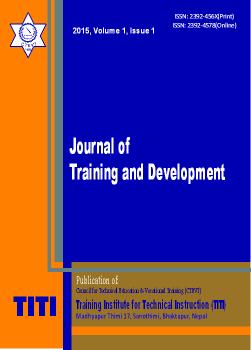Technical Education and Vocational Training for Sustainable Development
DOI:
https://doi.org/10.3126/jtd.v1i0.13085Keywords:
Technical Education, Vocational Training, Sustainable Development, barriersAbstract
Technical Education and Vocational Training is taken as an integral part of the national development. This has an important role in the national sustainable development. The knowledge, skills and attitudes are the overall aspects of the lifelong learning. In the context of Nepal, it has provided skills and jobs to many people who are away from the general education having several barriers within them. TEVT covers all the FIETS aspects of sustainability. This study has tried to highlight the major essence of the Technical Education and Vocational Training for the Sustainable Development of the nation. This paper has made an attempt to promote the TEVT through the perspectives of sustainable development. So it has highlighted on the aspects of education for sustainable development and the barriers behind it.
DOI: http://dx.doi.org/10.3126/jtd.v1i0.13085
Journal of Training and Development Vol.1 2015: 15-20
Downloads
Downloads
Published
How to Cite
Issue
Section
License
Authors who publish with this journal agree to the following terms:
- Authors retain copyright and grant the journal right of first publication with the work simultaneously licensed under a Creative Commons Attribution License that allows others to share the work with an acknowledgement of the work's authorship and initial publication in this journal.
- Authors are able to enter into separate, additional contractual arrangements for the non-exclusive distribution of the journal's published version of the work (e.g., post it to an institutional repository or publish it in a book), with an acknowledgement of its initial publication in this journal.
- Authors are permitted and encouraged to post their work online (e.g., in institutional repositories or on their website) prior to and during the submission process, as it can lead to productive exchanges, as well as earlier and greater citation of published work (See The Effect of Open Access).




